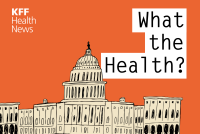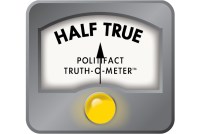Latest California Healthline Stories
Nursing Homes Are Left in the Dark as More Utilities Cut Power To Prevent Wildfires
A nursing home in Colorado had 75 minutes to prepare for a power outage that lasted 28 hours. Such public safety power shut-offs are being used more often as a fire prevention tool, but not all health facilities are prepared.
Residencias de adultos mayores quedan a oscuras en la lucha contra los incendios forestales
A medida que se generalizan los cortes de electricidad preventivos, las residencias de adultos mayores se ven obligadas a evaluar cómo prepararse. Pero no debería depender sólo de las residencias, según autoridades del sector y académicos.
Readers Issue Rx for Clogged ERs and Outrageous Out-of-Pocket Costs
California Healthline gives readers a chance to comment on a recent batch of stories.
New Help for Dealing With Aggression in People With Dementia
A sedative shouldn’t be the first thing tried to help people with dementia who exhibit distressing behaviors. A new website is a comprehensive, free resource that offers guidance to caregivers.
KFF Health News' 'What the Health?': Anti-Abortion Hard-Liners Speak Up
While Republican candidates in many states downplay their opposition to abortion, the most vehement wing of the movement, which helped overturn Roe v. Wade — those who advocate prosecuting patients, outlawing contraception, and banning IVF — are increasingly outspoken. Meanwhile, some state legislatures continue to advance new restrictions, like a proposal moving in Louisiana to include abortion medications mifepristone and misoprostol on the list of the most dangerous drugs. Alice Miranda Ollstein of Politico, Rachel Roubein of The Washington Post, and Joanne Kenen of the Johns Hopkins schools of public health and nursing and Politico Magazine join KFF Health News’ Julie Rovner to discuss these stories and more. Also this week, Rovner interviews Shefali Luthra of The 19th about her new book on abortion in post-Roe America, “Undue Burden.”
Nursing Homes Wield Pandemic Immunity Laws To Duck Wrongful Death Suits
More than 172,000 nursing home residents died of covid. In lawsuits, some families who lost loved ones say they were misled about safety measures or told that covid wasn’t a danger in their facilities.
Stranded in the ER, Seniors Await Hospital Care and Suffer Avoidable Harm
Many older adults who need hospital care are getting stuck in emergency room limbo — sometimes for more than a day. The long ER waits for seniors who are frail, with multiple medical issues, lead to a host of additional medical problems.
Biden Administration Sets Higher Staffing Mandates. Most Nursing Homes Don’t Meet Them.
The staffing regulation was disparaged by the industry as unattainable. Patient advocates say it doesn’t go far enough. Labor unions welcomed the requirement.
Medicare’s Push To Improve Chronic Care Attracts Businesses, but Not Many Doctors
Most Medicare enrollees have two or more chronic health conditions, making them eligible for a federal program that rewards physicians for doing more to manage their care. It shows promise in reducing costs. But not many doctors have joined.
Biden Is Right About $35 Insulin Cap but Exaggerates Prior Costs for Medicare Enrollees
Most Medicare enrollees likely were not paying a monthly average of $400 — as President Joe Biden stated — before the insulin cap took effect. However, because costs and other factors result in widely varying prices, some Medicare enrollees might have paid that much in a given month.














